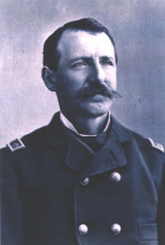Albert Jennings Fountain
Albert Jennings Fountain (born October 23, 1838 in Staten Island , New York ) was an American politician . Between 1871 and 1873 he was lieutenant governor of the state of Texas .
Career
Albert Fountain attended the public schools in his home country as well as Columbia College . In the 1850s he moved to California , where he worked as a newspaper reporter for the Sacramento Union newspaper. During this time he was also a reporter on the events in Nicaragua in connection with the attempted invasion of William Walker . After studying law and being admitted to the bar in 1860, he began to work in this profession in California. In 1861, he joined a California volunteer unit to take part in the Civil War. His unit was ordered to the southwestern United States. In 1862 he was involved in the occupation of the New Mexico Territory . Until 1864 he took part in the civil war. Then he was a member of the New Mexico Territory militia. There he took part in some Indian campaigns against the Apaches , where he was wounded in the meantime. He then settled in El Paso, Texas, where he worked for the United States Property Commission , which ruled on the granting of land that had previously belonged to the Confederate government . After that he was employed by the local tax authority. He also practiced there as a lawyer.
Politically, Fountain joined the Republican Party . He was a member of the Texas Senate between 1870 and 1874 . Between 1871 and 1873 he was President Pro Tempore its acting chairman. In this capacity he was, since the post of lieutenant governor had been vacant since the resignation of James W. Flanagan , at the same time acting lieutenant governor and representative of Governor Edmund J. Davis . It is noteworthy that as a state senator, Fountain introduced the Texas Rangers reintroduction law . These had been abolished during the civil war. As a supporter of the radical wing of his party, he naturally made many enemies with their opponents. There were even some duel demands . He killed at least one man in a duel.
In 1873, Fountain moved to Mesilla , what is now New Mexico , where he practiced as a lawyer. He later became deputy prosecutor and probate judge there. In 1877 he founded the Mesilla Valley Independent newspaper, which appears in English and Spanish . Politically, he continued his career as a member of the territorial House of Representatives. When he was elected to the body in 1888, he proposed the future US Senator and Secretary of the Interior Albert B. Fall . Both men were bitter rivals. Two years later he lost to Fall while attempting re-election. As a lawyer, he defended the notorious William Bonney ( Billy the Kid ), among others . However, he lost the trial and Bonney was sentenced to death. At the time of his mysterious disappearance, he was serving as prosecutor on several charges against cattle thieves. On February 1, 1896, Albert Fountain and his son, who accompanied him, disappeared on their way home from a court hearing in Lincoln to Mesilla. A trace of the two was never found again. There were no bodies, but they were believed to have been murdered. There were a large number of suspects, from his political opponents to the criminals or criminal gangs he had accused. Some suspects were charged with murder, but acquitted because there was no evidence of murder because there were no bodies.
Web links
- Albert Jennings Fountain in the database of Find a Grave (English)
- Albert Fountain: The Texas Man
- Albert Jennings Fountain in the Handbook of Texas
Individual evidence
| personal data | |
|---|---|
| SURNAME | Fountain, Albert Jennings |
| BRIEF DESCRIPTION | American politician |
| DATE OF BIRTH | October 23, 1838 |
| PLACE OF BIRTH | Staten Island , New York |
| DATE OF DEATH | after 1895 |

